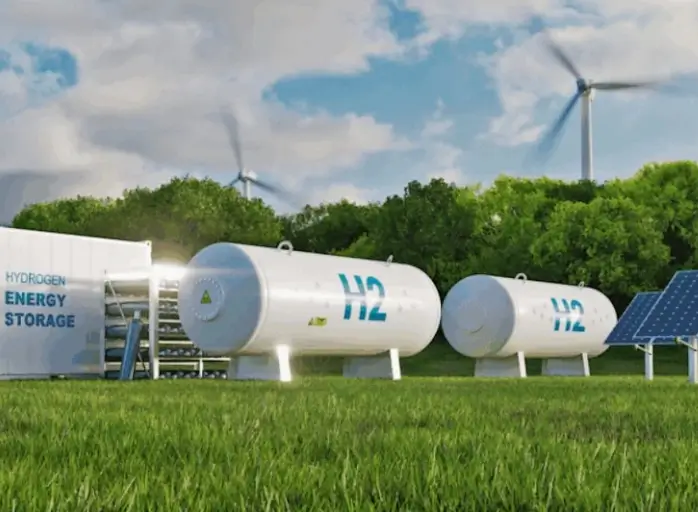
Exploring solutions to reinforce circular and sustainable constructions
In collaboration with Luxinnovation and the Betriber & Emwelt platform, the Luxembourg Institute of Science and Technology (LIST) organised a conference on “Sustainable Construction for Resilient Cities” on 6 July 2023. Speakers at a dedicated panel explored levers to decarbonise the sector and facilitate the growth of the circular economy.
 Abigail Okorodus
Abigail Okorodus
 New technologies and innovations are upending the status quo in a variety of industries, including construction. A dedicated panel, moderated by Charles-Albert Florentin, Cluster Manager – Cleantech at Luxinnovation and Bruno Domange, Senior Environmental Engineer at LIST, focused on the challenges facing construction professionals and the need to integrate new approaches, technologies, and innovations in today’s construction projects.
New technologies and innovations are upending the status quo in a variety of industries, including construction. A dedicated panel, moderated by Charles-Albert Florentin, Cluster Manager – Cleantech at Luxinnovation and Bruno Domange, Senior Environmental Engineer at LIST, focused on the challenges facing construction professionals and the need to integrate new approaches, technologies, and innovations in today’s construction projects.
Several presentations by high-level construction specialists and public administrations in Luxembourg stressed the need to rethink construction practises throughout the building life cycle in order for the sector to advance towards net-zero.
How can we move faster, give more freedom to the various players to at least test or implement innovative solutions…
“For everything that we build today, a large part of the emissions will be emitted in the years to come,” stated Paul Schosseler, Director Sustainable Construction and Circular Economy at the Ministry of Energy and President of the national council for sustainable construction CNCD, a private-public initiative with the mission to promote sustainable construction in Luxembourg.
Catching up with rapid innovations in the sector
According to Jean-François Trapp, Partner at law firm Baker McKenzie, while Luxembourg has integrated various legal concepts to foster sustainable developments in the sector, there is still potential for improvement. “How can we move faster, give more freedom to the various players to at least test or implement innovative solutions in the long run, and ensure that things happen faster?”
In the context of Luxembourg, he commended the frequent application of the “soft law” approach to new inventions, citing the increased flexibility it provides. He did, however, warn that it is not “adaptable to all kinds of innovations.” For example, the installation of “Tiny Houses,” sustainable, adaptable, and alternative housing that requires fewer materials and energy, recently fell under the jurisdiction of municipalities. They nonetheless have the option of adapting their regulations accordingly or not.
For everything that we build today, a large part of the emissions will be emitted in the years to come.
He stated that some lessons can be derived from the implementation of the Elan Law in France and the Buildings Energy Act in Germany, which were designed to streamline project execution and set energy performance standards in buildings, respectively. To encourage innovation in the Luxembourg building industry, he proposed the establishment of a “regulatory sandbox” that allows various actors to test new ideas or pilot programmes without necessarily adhering to the full regulatory framework, the proposal of a similar Elan law tailored to Luxembourg, and the issuance of building permits without a specific designation (permis de construire sans affectation). He also emphasised measures in the Netherlands to adapt supply chains to the circular economy and to implement a common database for construction management.
Low carbon construction roadmap
Mr Schosseler presented the recent “Low carbon construction roadmap” in Luxembourg, which considers the entire life cycle of buildings, from material procurement and manufacturing to deconstruction or demolition. “The roadmap’s three main objectives are to establish a carbon budget, estimate a baseline, and set up decarbonisation pathways,” he said. These are further subdivided into work packages.
We have to be able to adapt our infrastructures.
Beginning in September 2023, a conference dedicated to the roadmap, as well as various workshops, will be organised. These events will highlight the future carbon footprint approach, its application to construction materials and activities, as well as low-carbon design and construction solutions and models for managing and reporting carbon emissions.
Sustainable construction project examples: Wooden & Rout Lëns
Sandra Huber, Chief Development Officer of IKO Real Estate, noted that the company’s “criteria for evaluating projects has evolved significantly and takes into consideration core values like responsibility, commitment, innovation, and excellence.” The Wooden project, a low-carbon building project with a completely wood supporting structure that utilised prefabrication and off-site construction techniques, serves as a practical illustration of these values. The Rout Lëns sustainable residential pilot project in Esch-sur-Alzette, which aspires to achieve a carbon neutrality certification by 2035, is another example.
Common approach: efficient storage and flow of materials
A question from the audience delved into solutions for the efficient storage and flow of demolition and other building materials throughout the supply chain to the construction site, as well as potential plans to establish a Construction Consolidation Centre in Luxembourg – similar to platforms in Brussels, Paris, and London.
“We are actively working on solutions with the Ministry of the Economy in this area, but it will take some time to fully implement. However, we are convinced that we need both a virtual and a physical platform to meet these needs,” asserted Mr Florentin. Mr Bruno Renders, CEO of CDEC Group (Conseil de Développement Economique de la Construction), pointed out that “a standardised approach” would be a game-changer, although innovative storage mechanisms have been conceived within the scope of private projects.
Applying innovations to promote better water management
Another question focused on the implementation of existing solutions for circular water management in Luxembourg, especially the reuse of grey water.
“Water is an essential resource and I think that climate change is showing us today that the drought in Luxembourg in the middle of August is a reality. We have to be able to adapt our infrastructures,” said Mr Renders. He referenced collaboration between the CDEC Group and the Luxembourg water management authority (Administration de la gestion de l’eau) for a training and certification course for companies, but also for local authorities.
Water is an essential resource and I think that climate change is showing us today that the drought in Luxembourg… is a reality.
“We are one of the countries on red alert when it comes to water resources. For the past four years, we have been carrying out a lot of studies and work on grey and black water. We’re not giving up hope, we’re going to try again with a different operational strategy”, added Mrs Huber.
Photo credit: Luxinnovation







